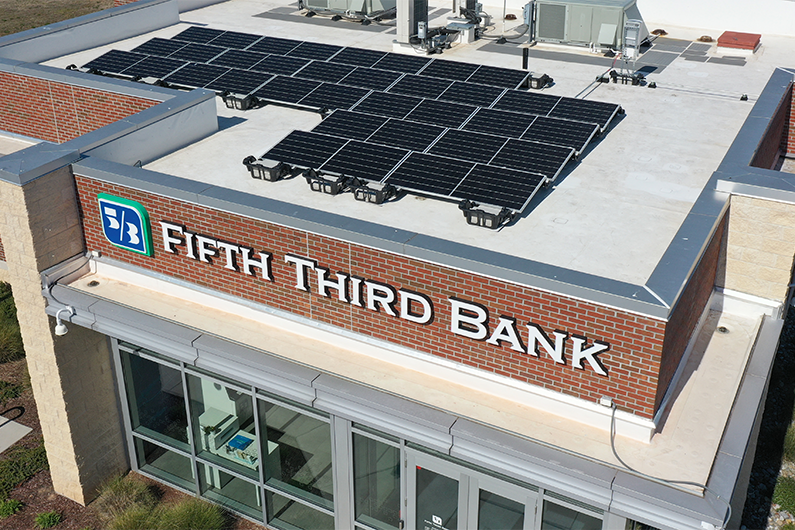Sustainability
Creating resilient and sustainable communities to benefit all we serve.
We are driven by our understanding that integrating sustainability into all aspects of our business creates long-term value for our customers and strengthens the communities we serve.
Banking is key to the development of new technologies, financing new infrastructure and helping customers who desire to make the decarbonization transition. We embrace our opportunity and responsibility to meet these growing needs.
To advance our commitment and address climate change impacts, Fifth Third is focused on four strategies:
![]()
Sustainable Finance
![]()
Climate Risk Management
![]()
Sustainable Operations
![]()
Sustainable Communities
Sustainable Finance

We have set an ambitious 10-year, $100 billion environmental and social finance target through 2030. The target demonstrates our financial commitment to accelerating the transition to a more sustainable and inclusive economy for all. As of Dec. 31, 2024, Fifth Third provided $45.3 billion in sustainable financing under the target.
Environmental categories for the $100 billion target include renewable energy, green buildings, energy efficiency, clean transportation, circular economy, pollution prevention and control, and other environmental categories.
Social categories include affordable housing, access to essential services, access to basic infrastructure, employment generation, food security and sustainable food systems and socioeconomic advancement and empowerment. Also included in the target are sustainability-linked loans and sustainability bonds.
Through Dividend Finance, a leading national provider of solar and sustainable home improvement financing, Fifth Third offers residential financial services and assists homeowners by promoting innovative energy efficiency, decarbonization and peak energy reduction by deploying, integrating and financing a wide range of distributed energy technologies. The technologies include smart thermostats, fuel-cells, smart electric panels, electric vehicle charges, solar PV and more.
Climate Risk Management
Fifth Third identified climate-related risk as an "emerging" risk in 2017. Since then, the Bank has updated its Enterprise Risk Management Framework to define climate risk for the Bank, and physical and transition risk was incorporated into each of our risk types.
Physical risks from a changing climate are already present and growing. These risks can be acute (event-driven) or chronic longer-term shifts in the environment. Transitioning to a lower-carbon economy may also present additional risks such as energy transition policies, disruptive technological advancements, including clean energy development storage, and shifts in consumer preferences.
The integration of climate risk into the framework was among the first tasks of the Bank’s newly appointed climate risk officer in 2021. The appointment underscored the Bank’s commitment to managing climate risk and helped ensure the development and maturation of the Bank’s climate risk identification and monitoring program.

Sustainable Operations
Operational sustainability, the reduction of our own environmental and carbon footprint, has been key to our environmental sustainability program since its inception in 2010. In addressing our own environmental impact, we better prepare our organization for future changes by reducing our exposure and risk to decarbonization, energy market volatility and potential carbon pricing scenarios.
Fifth Third is currently operating under six ambitious targets established in 2022 and to be achieved by 2030. Goals include purchasing 100% renewable power, a 40% reduction in energy use, 75% reduction in location-based GHG emissions, 75% waste diversion from landfills, 50% reduction in water use, and a 75% reduction in paper use. As of Dec. 31, 2024, we have achieved our renewable power and energy use reduction goals and are making significant progress on the remaining goals. See the Bank’s 2024 Sustainability Report for details.
Fifth Third completed 17 rooftop solar panel installations at new financial centers in 2024. In all, Fifth Third has more than 30 retail locations with rooftop solar generating up to 90% of annual electric needs at these locations. Fifth Third’s expansion of electric vehicle charging continued in 2024. To support employees that make the transition to electric vehicles, we offer EV charging stations at our Madisonville Operations Center and downtown headquarters in Cincinnati; our Grand Rapids-based corporate service center; and our corporate office in Rosemont, Chicago. We also installed EV charging at retail banking locations as part of our program to extend this amenity into the community, supporting customers and local residents. Additional charging stations are being added at select retail locations.
Sustainable Communities
Fifth Third is seeing an increasing challenge around energy affordability, a growing desire for energy independence, and the need for increased climate resilience for events like natural disasters in the communities it serves. In response, Fifth Third has built a strategy to support more sustainable communities utilizing our place-based economic development model.
In addressing these challenges, Fifth Third seeks to develop a series of sustainable community tools, such as:
- Market building through green banks, community development financial institutions and community partners.
- Development of sustainable financial products to meet specific needs.
- Enhanced community engagement through place-based partner networks.
Community Solar Pilot
A pilot program involving the installation of solar panels for low-income residents is helping to make the Near East Side in Columbus, Ohio, a more sustainable community and to build wealth for homeowners. Fifth Third is supporting a blended finance approach in collaboration with key community partners, including the region’s local green bank. Participating homeowners are expected to see a reduction in electric costs for six years, before taking full ownership of the solar systems and all the electricity it produces in year seven.
Fifth Third also has made a $5 million equity equivalent investment (EQ2) in a sustainable financing program delivered by Local Initiatives Support Corporation (LISC). As part of this investment, LISC will provide loans to sustainable infrastructure projects—from energy efficiency improvement to solar panels—targeted to low- and moderate-income borrowers.